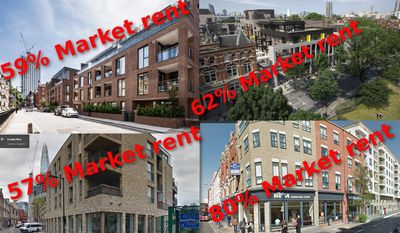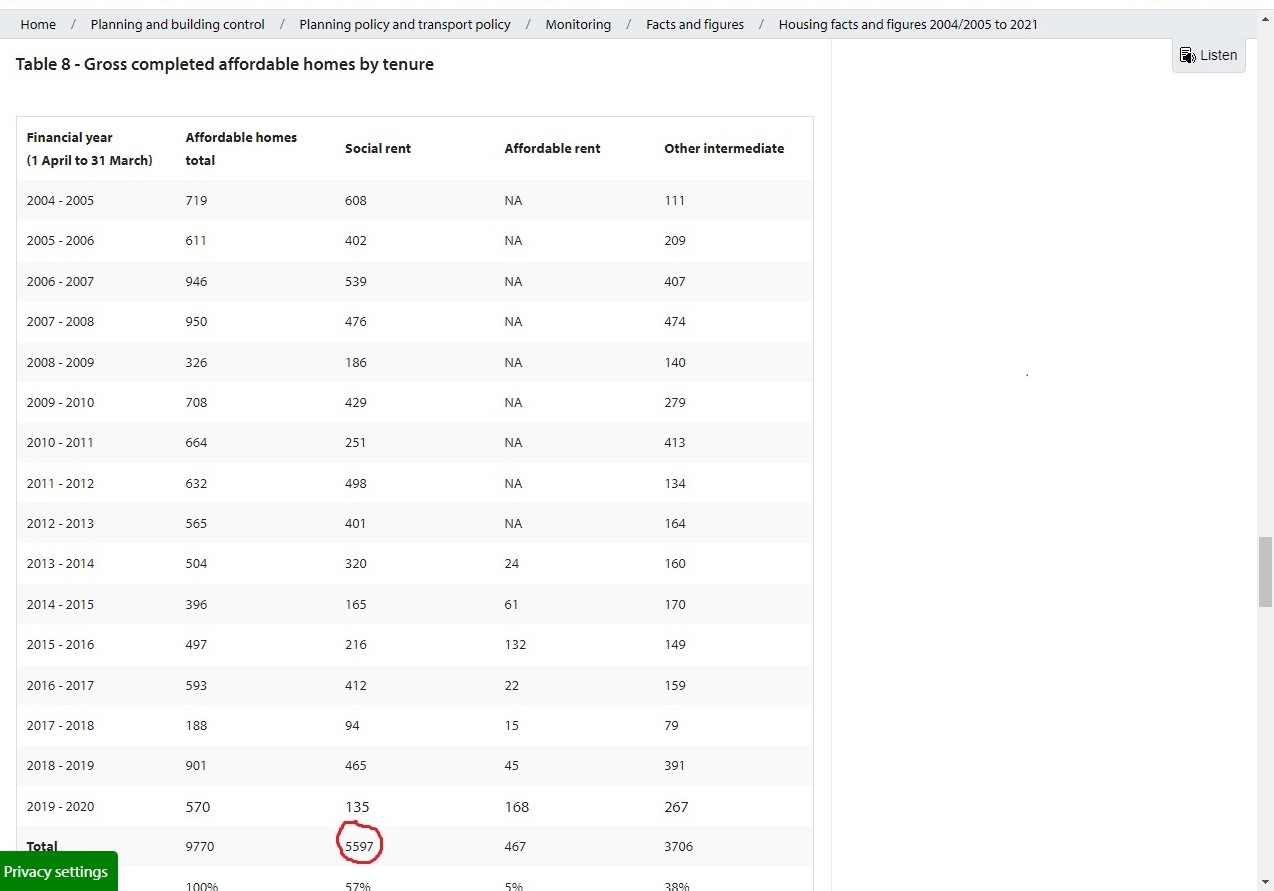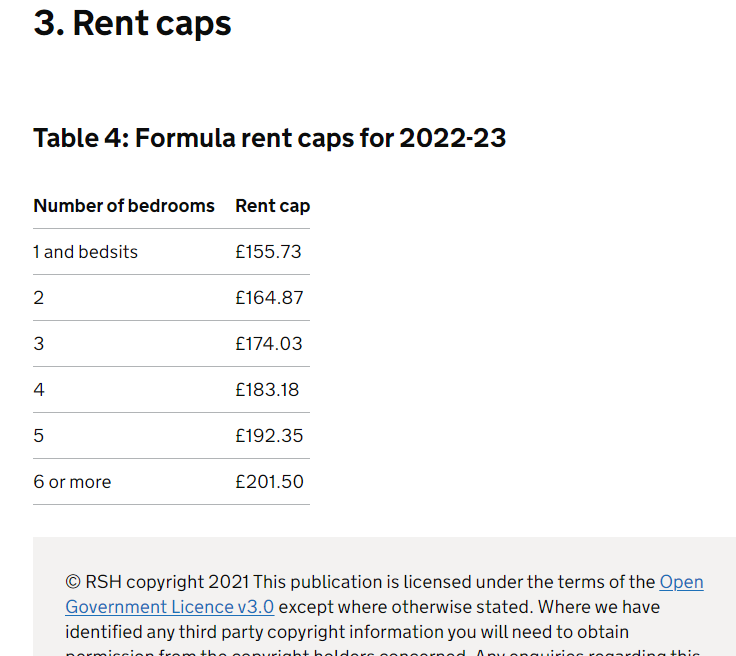
A complaint by the 35% Campaign that Southwark has no effective system for the delivery of affordable housing, has been rejected by the Local Government and Social Care Ombudsman. The judgement (LINK) comes after an 18-month enquiry process, with the Ombudsman ruling that 'We found no fault because the Council has effective procedures for carrying out its functions'.
However, the Ombudsman declined to investigate discrepancies between the affordable housing figures given on Southwark's interactive audit and those found on other reports, from both Southwark Council and the Greater London Authority (GLA), primarily on the ground that effective compliance procedures were in place.
These discrepancies were not minor. They show a shortfall of over 3,500 in the number of recorded social rented units and number audited. There are also more than 200 completed schemes, listed by the GLA, that remain unaudited.

The two complaints
This was the second complaint to the Ombudsman on this issue. Southwark had said it would introduce effective monitoring procedures, after the Ombudsman found that none were in place, following an earlier complaint in 2016 . The new procedures were to include annual audits. In the six years since then, though, only two incomplete audits have been published. An online monitoring tool, able to record live data, and commissioned by Southwark was never launched.
In response to the second complaint, Southwark explained the four-year gap between the first audit in 2017 and the second in 2022 was because of the large amount of data that had to be processed. Most of this task had been undertaken by two officers, later increased to ten officers to complete the project. Southwark also said that 'better suited' off-the-peg software had replaced the online tool it had commissioned and that it was now working with another software developer to build a comprehensive new tool.
Southwark explained enforcing the legal s106 agreements, which guarantees affordable housing, was complicated by their variety. It cited one legal case, where affordable homes had been returned after a significant failure to comply with the s106, but said otherwise 'most breaches....could easily be resolved'.
The Ombudsman's decision
The Ombudsman noted in his decision the 'gap of several years between issuing annual reports and it is only in the last year that it [the council] had substantially completed its database'. Nonetheless he concluded that this did not amount to a fault, because the task 'was always likely to take a long time...'. No time period had been set for this in the Ombudsman's 2016 complaint decision. The Ombudsman also decided that the council was not at fault for replacing the bespoke tool with proprietary software, because this was a matter for them to decide.
The Ombudsman therefore concluded 'I am satisfied that the Council now has effective means to capture and record AHO [Affordable Housing Obligations] for enforcement and other purposes'.
What we think
....six years too late
The Ombudsman's decision is a disappointment to us. We believe that the Ombudsman treats Southwark very benevolently, given what his own report tells us. It says that Southwark only** 'now** has effective means' of monitoring affordable housing delivery (our emphasis), six years after the issue came to light; the report does not dwell on what has been happening in the meantime.
.....the lost tool and the missing units
A bespoke tool that could have monitored real-time delivery has been discarded and reverted to spreadsheets, with the possibility of developing a different purpose-built tool later.
The Ombudsman's report also says that the database of schemes has only been 'substantially' completed in the last year. This is a generous description, given that there is evidence of a 3,556 unit gap between the number of units of social housing Southwark says it has delivered and those recorded by the audit. Southwark's Housing Facts and Figures webpage (Table 8) says that 5,597 social rented homes have been built since 2004/05, whereas only 2,041 have been recorded in the audit (since 2002).

....the missing schemes
The Greater London Authority (GLA), which funds much affordable housing, also has responsibility for monitoring its delivery across London. Our examination of the GLA datahub found 209 completed schemes listed as having provided affordable housing in Southwark, as part of a planning permission, but which do not appear in Southwark's own audit.
One-hundred and forty three of these schemes can be found on Southwark's planning portal and date from at least 2004 onwards. Many are simple one- and two-unit conversions, but there are also much larger schemes, including parts of Elephant Park and Canada Water with thirty-eight schemes for between ten and 100 units.
....weak enforcement actions
There are also a couple of alarming explanations from Southwark's officers, about how affordable housing is secured and retained. The first is that 'there were cases where there had been changes between what was originally expected during the planning (sic) and what was finally agreed in section 106 agreements. It was sometimes difficult to know what changes had occurred....' (our emphasis).
There should be no changes between what is approved at planning committee and and 'what was finally agreed in s106 agreements'. Planning committees approve schemes that provide a precise amount of affordable housing of given tenures. If the developer cannot deliver what has been agreed at committee, then a s106 agreement for something different should not be signed. Southwark's officers should also be able to say why there have been changes, to ensure that they have been made properly.
Southwark's officers explain that 'evolving policy' or loss of funding may be reasons for changes, between committee resolutions and legal agreements. Again, this should not be happening; applications are judged against emerging policy and changes to funding, or to the viability of an agreed scheme should be addressed by way of formal variations. Officers note that some applications change this way, but only on 'other occasions'.
In any event, a look at the Southwark's planning enforcement action webpages shows sixteen enforcement notices relating to affordable housing have been issued since 2016. Ten of these are for not responding to the audit and were lodged on the same day (10 May 2022) - three months after the Ombudsman began his investigation). Three remain open, including an audit of social rents on Elephant Park (link).
....Gutenberg Court - the £295 social rent
The Ombudsman's report notes that 'In some cases, the type of AHO [Affordable Housing Obligations] tenancy was not what had been required'. The report does not say how often this has occurred, but one instance that has come to light is that of Gutenberg Court, which was also one of the schemes cited in our original 2016 complaint. This was a development of 38 homes, including nine social rented homes, approved by Bermondsey Community Council planning committee in 2011. Southwark Law Centre complained to Southwark Council in October 2021 that the social rented units were being wrongly advertised to the housing waiting list as 'market related rent', not 'social rent', on the council's Homeseach webpages. The development now appears in Southwark's audit as delivering nine affordable rent units (which can be up to 80% market rent) and zero social rent units.

The difference between a market related rent rent and social rent can be seen from the rents that are being charged - £261.44pw (one-bed) and £295.50 (two-bed). This compares to the social rent formula rent caps for 2022/23 of £155.73 (one-bed) and £164.87 (two-bed).

The scheme has been 'red-flagged' on Southwark's audit, but no enforcement action is listed on the enforcement action webpages.
Conclusion - everything is not alright
The Ombudsman's findings will be welcomed by Southwark, particularly following his adverse finding in 2016.
But the Ombudsman's paints a picture of a service that is still not on top of the monitoring job, six years after he first exposed the problem. Just two officers were tasked with the audit, later increased to ten, 'to complete the project'. Only two annual audits were completed in six years and solid evidence from Southwark and the GLA sources, that a large number of schemes and units have been omitted, has not been investigated. A bespoke online tool was commissioned, then abandoned (at the cost of £230k), with another now apparently in the works.
The process for securing affordable housing also appears haphazard. Consequential changes are being made to approved applications, for different reasons and at different points in the planning process, which Southwark officers cannot properly explain - a problem that would not arise if we had an effective monitoring process.
It is the facts on the ground though, that really expose Southwark's monitoring failure. Gutenberg Court is one example of a scheme with social housing, approved by planning committee several years ago, that is now appearing on Southwark's Homesearch website with 'market related' rents very much higher than social rents. Elephant Park is also under scrutiny because of the high level of its social rents. For as long as we have cases like this, Southwark Council cannot complacently say every thing is alright, simply because the Ombudsman says so.